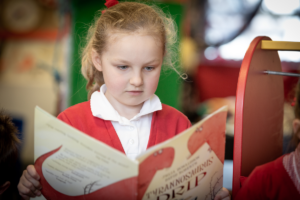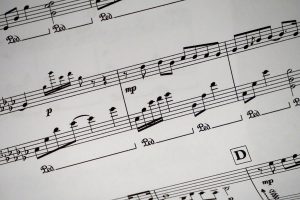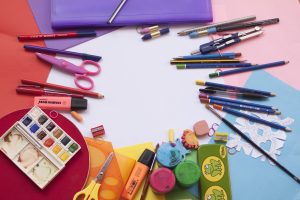Literacy
Literacy at Langley First School
Our ambition is to provide a literacy curriculum that allows all of our children to become independent and fluent communicators who are skilful and passionate readers and writers.
Reading Curriculum Intent:
Our aim is to equip all of our children with the skills needed to become independent, fluent, well-rounded and passionate readers. Reading is at the core of our curriculum and school culture. Regular and accurate assessment continually informs teaching of phonics, comprehension and fluency to ensure all children make good progress.
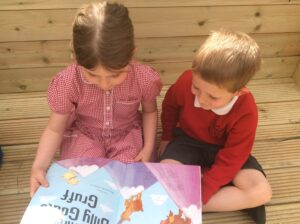
Writing Curriculum Intent:
Reading is at the core of our curriculum and writing is continually taught alongside it. Writing opportunities are responsive, relevant and purposeful. The skills used to develop an independent writer are taught progressively.
Termly overviews are shared on the website alongside end of year expectations
Our curriculum is continually reviewed to ensure we are doing all we can to reach our ambition.
Reading
Phonics
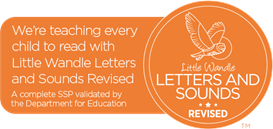
Foundations for phonics in Nursery: We provide a balance of child-led and adult-led experiences for all children that meet the curriculum expectations for ‘Communication and language’ and ‘Literacy’. These include: sharing high-quality stories and poems,
learning a range of nursery rhymes and action rhymes,
activities that develop focused listening and attention, including oral blending
attention to high-quality language.
We ensure Nursery children are well prepared to begin learning grapheme-phoneme correspondences (GPCs) and blending in Reception.
Daily phonics lessons in Reception and Year 1
We teach phonics for 30 minutes a day. In Reception, we build from 10-minute lessons, with additional daily oral blending games, to the full-length lesson as quickly as possible. Each Friday, we review the week’s teaching to help children become fluent readers.
Children make a strong start in Reception: teaching begins in Week 2 of the Autumn term.
We follow the Little Wandle Letters and Sounds Revised expectations of progress: Children in Reception are taught to read and spell words using Phase 2 and 3 GPCs, and words with adjacent consonants (Phase 4) with fluency and accuracy. Children in Year 1 review Phase 3 and 4 and are taught to read and spell words using Phase 5 GPCs with fluency and accuracy.
Daily Keep-up lessons ensure every child learns to read
Any child who needs additional practice has daily Keep-up support, taught by a fully trained adult. Keep-up lessons match the structure of class teaching, and use the same procedures, resources and mantras, but in smaller steps with more repetition, so that every child secures their learning.
We timetable daily phonics lessons for any child in Year 2 or 3 who is not fully fluent at reading or has not passed the Phonics Screening Check. These children urgently need to catch up, so the gap between themselves and their peers does not widen. We use the Little Wandle Letters and Sounds Revised assessments to identify the gaps in their phonic knowledge and teach to these using the Keep-up resources – at pace.
If any child in Year 3 to 4 has gaps in their phonic knowledge when reading or writing, we plan phonics ‘catch-up’ lessons to address specific reading/writing gaps. These short, sharp lessons last 10 minutes and take place at least three times a week.
Teaching of Reading
Reading practice sessions three times a week
Initially, we teach children to read through reading practice sessions three times a week. These:
are taught by a fully trained adult to small groups of approximately six children,
use books matched to the children’s secure phonic knowledge using the Little Wandle Letters and Sounds Revised assessments,
are monitored by the class teacher, who rotates and works with each group on a regular basis.
Each reading practice session has a clear focus, so that the demands of the session do not overload the children’s working memory. The reading practice sessions have been designed to focus on three key reading skills:
decoding,
prosody: teaching children to read with understanding and expression,
comprehension: teaching children to understand the text.
In Reception these sessions start in Week 4. Children who are not yet decoding have daily additional blending practice in small groups, so that they quickly learn to blend and can begin to read books.
In Year 2 and 3, we continue to teach reading in this way for any children who still need to practise reading with decodable books.
Additional reading support for vulnerable children
Children in Reception and Year 1 who are receiving additional phonics Keep-up sessions read their reading practice book to an adult daily.
Ensuring consistency and pace of progress
Every teacher in our school has been trained to teach reading, so we have the same expectations of progress. We all use the same language, routines and resources to teach children to read so that we lower children’s cognitive load.
Weekly content grids map each element of new learning to each day, week and term for the duration of the programme.
Lesson templates, Prompt cards and How to videos ensure teachers all have a consistent approach and structure for each lesson.
The Reading Leader and SLT use the Audit and Prompt cards to regularly monitor and observe teaching; they use the summative data to identify children who need additional support and gaps in learning.
Reading Books
At the start of our children’s reading journeys, decodable reading practice books are taken home to ensure success is shared with the family.
Reading for pleasure books also go home for parents to share and read to children.
We use the Little Wandle Letters and Sounds Revised parents’ resources to engage our families and share information about phonics, the benefits of sharing books, how children learn to blend and other aspects of our provision, both online and through workshops.
Our library is equipped with finely levelled books from the PM scheme to turquoise level. This scheme is progressive and develops rounded readers who can use a variety of techniques to access the text. There is a focus on recognising high frequency words, with graphemes introduced appropriately. We also have phonic-based schemes that focus on particular graphemes or groups of graphemes. There is also a wide range of other levelled texts from various schemes.
When children are beginning their reading journey, a teacher chooses two books per week for them. One of these will be from the PM scheme, with the other being a phonics focussed book that supports what they have learned in class. As the child develops the ability to make their own reading choices, they are encouraged to choose one book from their level (with a teacher choosing the second from the PM or phonics scheme, depending on which area would benefit from the further focus). As the child becomes an independent reader, they are gradually encouraged to choose both books from their level to develop their enjoyment for reading.
These two books stay in the children’s reading folders and are read at home and with staff, with both parties recording comments in the child’s reading record. For Years 2, 3 and 4, these records are tailor-made, detailing the various skills that each year group focuses on. This allows parents at home to see the expectations and challenges for their children and also what they should be supported with at home. It also includes a tally chart to ensure a wide range of genres are discovered through the child’s reading journey. This is bolstered by bookmarks for each band with suggested questions to further the reader’s understanding to support parents at home.
Reading for Pleasure
Though reading is at the core of our curriculum, we also place great importance in modelling, encouraging and teaching passion for reading. Story Time is after morning break in all classes. Skilled teachers deliver carefully selected texts in ways that engage the children, challenge their understanding and introduces new vocabulary. Chosen texts often link to current topics, seasons or events the children are experiencing, though the primary aim for these texts is to be enjoyable.
There are also frequent opportunities for the children to read to others. On the first Friday of every month, Year 2, 3 and 4 visit Nursery, Reception and Year 1 respectively to model reading for the younger children. This event provides confidence and pride for the older students, whilst sparking inspiration and enjoyment for the younger students. Twice a year, we host a week long book fair. This is preceded with competitions and posters to raise it’s awareness and increase excitement around books.
We have links with our local library, with every class visiting each half term to hear a story and choose a book to borrow. Before each summer holiday, the library holds an assembly to launch the summer’s reading challenge. We also have close links with Earsdon Grange Care Home, with students visiting regularly to share stories.
Every classroom boasts an area devoted to the independent enjoyment of reading. Their themes vary from classroom to classroom and from topic to topic for many.
Each year, we take part in National reading initiatives, such as World Book Day and National Poetry Day. The way we celebrate varies each year but always has the aim of heightening our children’s enjoyment of texts.
Our school library is timetabled to allow all the children to access it. Within the library are responsive displays used to share our love of reading, including book recommendations from children and staff, author specific sections and an audio library. This is also an area used to celebrate writing from across the school.
We host author visits, most recently from Stuart Reid, Tony Wilson and Liz Million. These visits include an assembly for the whole school with a focus on reading for pleasure as well as class-based workshops that inspire our readers and writers.
Teaching of Reading Beyond Phonics
Reading is at the core of our curriculum. The involvement in the Over and Over project helps to ensure that all of our children are accessing and enjoying stories as early as nursery. Children read on a 1 to 1 basis with an adult at least once a week from the beginning of reception. As the children continue their journey through school, this can change in response to what the class teacher knows will develop their reading further. From the end of Year 1, children experience guided reading groups and take part in shared discussions about carefully selected texts to challenge the group. Whole class reading is also used throughout the school, with children responding to text in their written or topic work frequently.
All staff have attended inference training and use this to plan opportunities to develop their classes reading skills. Comprehension and inference tasks often relate to relevant and recent topics and texts that the children are learning about.
Staff are aware of the various strategies a reader uses and have a work mat of these available during reading sessions (with individuals and groups).
Spelling, grammar, punctuation and vocabulary are often taught through guided and whole class reading opportunities.
The children’s reading skills are assessed each term on Target Tracker by teachers to highlight gaps in individuals’ attainment and monitor progress. PIRA assessments are completed termly, and Salford Reading Test’s biannually, to monitor each child’s reading age. For children identified by a teacher, the Salford Comprehension Test is also completed. These assessments provide a full picture for each child and indicates strengths in their reading. We also have YARK for children identified by class teachers as not making the expected development in reading comprehension. Children who are accessing extra reading through BR@P complete running records to highlight areas to develop. The PM benchmark is also used to support judgements on the book bands that children should be reading when there is uncertainty.
The outcomes of these assessments are shared with teachers readily and informs them when reviewing intervention groups and extra reading opportunities to ensure that progress is made by everyone.
Providing Support
With the regular, accurate assessment systems described in this document, our teachers can identify children who need further support to ensure they are achieving the expected progress and their age related expectation. This, coupled with continual, ongoing assessments, allow the teachers to be specific and impactful with interventions in phonics, reading for fluency, reading for comprehension, handwriting and other writing skills. These intervention sessions are often completed during assembly times or alongside literacy lessons when the lesson objective can still be accessed. A wide range of support resources for reading are readily available in our literacy support room. These include high frequency word flash cards, phonics games and word banks. Where needed, these resources can be kept in the child’s reading folder to be used at home as well.
When there is concern about the development of a child, teachers discuss next steps with the school SENCO, Claire March. Referrals to the Speech and Language Team or Language and Communication Team can be made where relevant to provide resources and a scheme of work to support children in overcoming specific difficulties in their reading development. Irene Gallagher is our language specialist and is highly skilled at delivering Speech and Language intervention programmes.
Clare Couch is our Boosting Reading At Primary specialist. She delivers the intense, ten week programme to children on our pupil premium register who are identified as not yet achieving age related expectation of attainment, with a focus on increasing their enjoyment for reading. Other trained members of the teaching support staff also deliver the programme to children identified as needing the support in their reading development.
Teaching staff are aware of the pupil premium children in their care and understand that their development and enjoyment for reading has to be closely monitored and encouraged.
Children who are identified as not enjoying reading by their class teacher are given an all access library card, allowing them to visit during break times outside of their regular timetable. This also comes with incentives and rewards for multiple visits.
In writing, a child may require support from a class teacher or teaching support staff regularly. Opportunities to write independently are still provided for these children to improve their enjoyment for writing and their resilience.
Use of the spelling assessments outlined in the SPaG section of this document identify children that could benefit from support being provided and delivered by members of the North Tyneside Dyslexia Team.
Writing
Writing for Purpose
Our children’s journey to becoming an independent writer begins with our early learning provision in nursery and reception. Communication and spoken language is devel-oped between peers and adults within a multitude of creative practical activities. Many of these make use of the outdoor learning provision. The variety of adventurous, practical activities requires the children to interact with others and develop their language skills by communicating with each other and hearing it’s use from adults who model it. These adventurous activities develop the children’s gross and fine motor skills which strengthen to ensure they can achieve a suitable, comfortable pencil grip. Mark-making opportunities also allow the children to begin developing their handwriting skills.
A strength of our school is the quality of extended inde-pendent writing produced across the school. Writing opportunities are frequent, varied and purposeful. Writing is often used to respond to a text, in both incidental writing (such as practicing writing questions to write questions to a character in a story) and extended (independent narrative writing or retells of historic events etc.) Extended writing is often build to, with previous lessons focussing on the skills that will be useful or assessed in the final piece. No single teaching strategy is taught exclusively to provide a range of strategies for the children to develop their writing styles. The importance of spoken language in the composing process is understood by staff and this is often used during the planning phase of a writing task. As outlined in the school’s feedback policy, one piece of writing each week is responded to with a success grid and a wish. The success grid often includes skills that have been taught in the build up to the lesson and are used for the style of writing they are doing. The wish responds to the expectations set out in the success grid and is used to assess each child’s under-standing or push their understanding further. Quality feedback is also given with the child present, either during the lesson or soon after, and it’s impact can be seen by the green markings made by the teacher (as detailed in the school’s feedback policy) and by the child’s editing with their purple polishing pens. What is chosen to be edited is dependent on the level of progression the individual child is currently working at and relies on the continual assess-ments made by our highly skilled teachers. The school’s handwriting policy outlines the expectation of letter formation, with joined writing expected to be introduced and modelled in Year Two. Adult’s writing in exercise books reflect the level that is expected by the individual child. When a child is secure with their joined writing, they receive a pen licence, which they are awarded in Golden Assembly, with future work being completed in pen.
Spelling, Punctuation, Grammar and Vocabulary
The skills needed to become an independent writer are introduced progressively in line with the National Curric-ulum. Spelling is monitored during phonics assessments and includes exception words. Spelling rules for lower Key Stage 2 are split between Year 3 and 4 as outlined in our spelling plan. The basic skills of SPaG, such as full stops, capital letters and expected spellings, are continual-ly monitored and addressed across the curriculum. This is done during shared or modelled writing, and with our feedback policy. Our feedback policy encourages children to take an active role in the editing of their work as teachers set high expectations for the standards of all the children’s written work. New grammar, punctuation or spelling rules are often introduced as verbal games, whiteboard work or within a shared text. A child is considered secure with these newly introduced rules when they can independently apply them to their own written work and demonstrate an understanding of their purpose.
Explorative vocabulary is also encouraged throughout the school, often through exposure in a shared text. Children discuss language they discover in stories that they learn through school, with teachers highlighting new meanings and synonyms. There is also a focus on new vocabulary for topic work across the Curriculum.
As a school, we endeavour to provide an environment that is free from the pressures of frequent testing, preferring to assess children’s spelling through it’s use in their extended writing. These assessments are recorded with the statements on Target Tracker termly. Where there are gaps in a child’s knowledge, intervention sessions are organised and reviewed termly. If a child’s spelling continues to cause concern, we have access to the HAST which indicates areas of weakness and wheth-er the child could have dyslexia. Where needed, we have access to the North Tyneside Dyslexia Team who can provide one to one assessments and create a programme to support them.
Spoken Language and Communication
Interaction with others forms the foundation of a fluent, skilled communicator. Our school provides many opportu-nities for our children to develop these skills through their spoken language. Nursery provide a language-rich environ-ment through collaborative, practical tasks. They also experience talk from a skilled adult who models speech constantly. Use of story telling from The Over and Over project allows the children to begin retelling oral stories, and adapt existing stories.
Reception’s new outdoor learning facility provides the children with a wide variety of practical, collaborative activities that continue to develop the children’s speaking and listening skills, as well as the fine and gross motor movements that will become the foundation for their handwriting. Through hearing and sharing stories, the children continually develop their spoken language skills.
Throughout the school, talk is used as a useful tool for developing cognitive learning. Opportunities for talk are constant across the curriculum—it is a fundamental element of our lessons and allows all of the children to access each lesson. Talk is often used when planning extended writing, working practically and collaboratively, and responding to text with drama.
Each year, every class hosts an assembly for the rest of the school and parents. This is a chance for each child to speak , perform and sing for an audience. Early Years and Key Stage One also perform a Nativity play each. Poems are also performed for parents at the Harvest Festival.
Our constant use of speech and language throughout school develops the social and emotional needs of the children and allows them to build lasting relationships with peers and appropriate relationships with teachers.
Celebrating Writing
We are proud of the quality and quantity of our extended writing throughout the school. We encourage our children to develop pride in their work and celebrate their successes with them. These rewards can be a gold star in their work, as outlined in our feedback policy. A child may be asked to show their piece of writing to another teacher, or the head teacher to showcase their work. Children can earn certificates for their written work in our assemblies, or for their resilience in mastering a particular skill. Written work is mounted and put onto our display boards to showcase the talent that we have in our classrooms. Children who are secure with their joined handwriting are awarded with a pen license in our celebration assemblies.
Every spring, we hold a handwriting competition for the most improved handwriting in each class. In the summer, we hold a competition for the neatest handwriting in each class. The winners are awarded with prizes in a celebration assembly, with runners up being awarded with stickers and pencils.
Some extended pieces of writing are written outside of the children’s exercise books, creating their own books, letters, invitations and posters, to make their writing as purposeful as possible.
Each year we take part in the North Tyneside Writing Competition and often enjoy great success, with representative from our school winning 1st and 3rd for Key Stage One, 2nd for lower Key Stage Two and 3 more highly commended pieces.
Social and Emotional Aspects of Learning
At Langley First School we aim to provide all children with a safe and secure learning environment where they feel happy and confident. In terms of our children’s literacy, we achieve this through regular celebrations around the children’s written work and opportunities to shine with their reading and spoken language skills.
We equip all children with the fundamental skills and enthusiasm for life long learning, empowering them to fulfil their full potential whilst maintaining their individu-ality. This is achieved through literacy by our use of texts to make learning enjoyable and meaningful.
We inspire motivation within children to continue to achieve outstanding levels of progress and attainment in all areas through a diverse, creative and knowledge-engaged curriculum which offers enriching and varied learning opportunities.
We promote a respectful and caring attitude towards each other, the wider community and its environment..
Staff CPD
This document outlines the our shared ambition for Literacy at Langley First School. Our journey to achieving this is ever-changing and developing, as is this document. To ensure that we are continually providing the most meaningful and engaging curriculum, staff attend relevant CPD opportunities regularly. These opportunities vary and include: year group specific training, phonics training, delivery of guided reading training, make reading engaging sessions, inference training and much more.
The nature of teaching requires staff to be responsive to changing cohorts, their needs and current events. Because of this, good practice is regularly shared and feedback from training is delivered to ensure all staff are as upskilled as possible.
Our curriculum adapts to the needs of each cohort and the individual children within them to ensure it is engaging, inclusive and meaningful.



